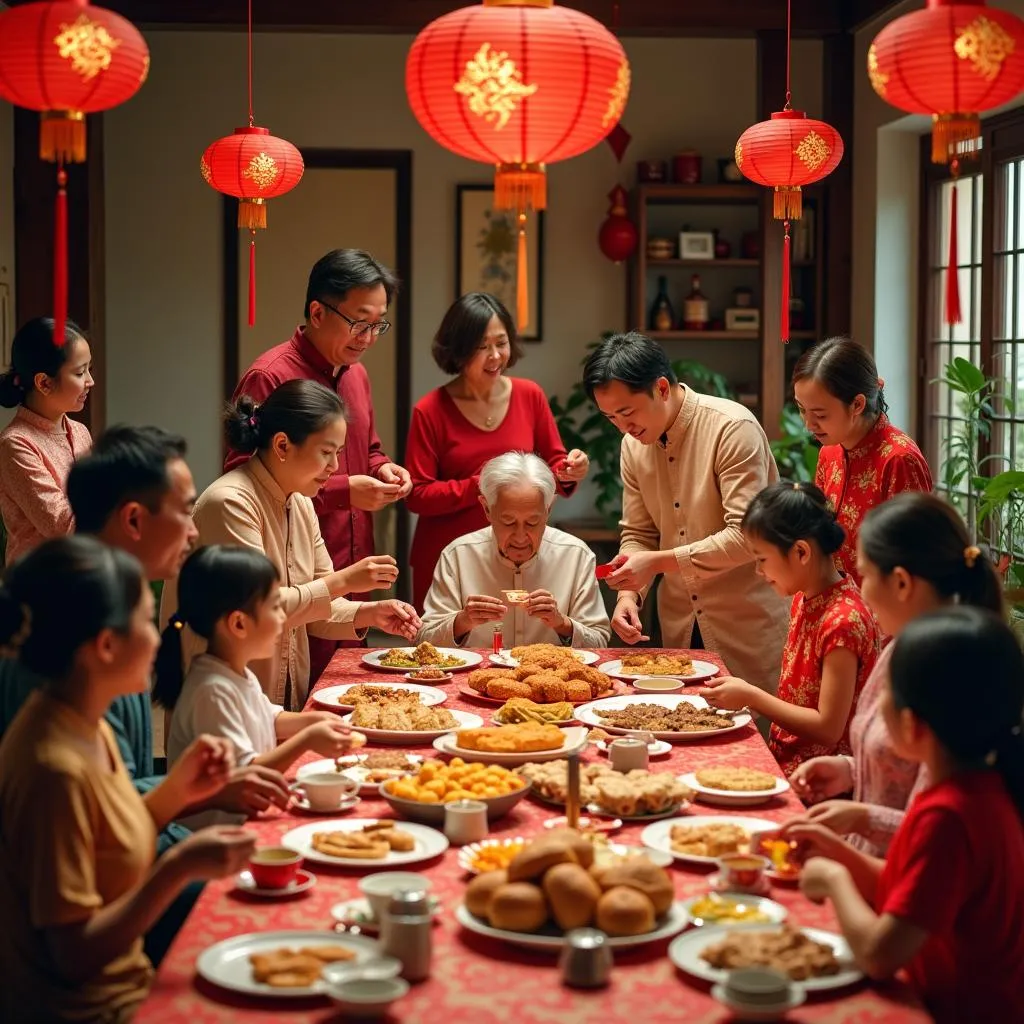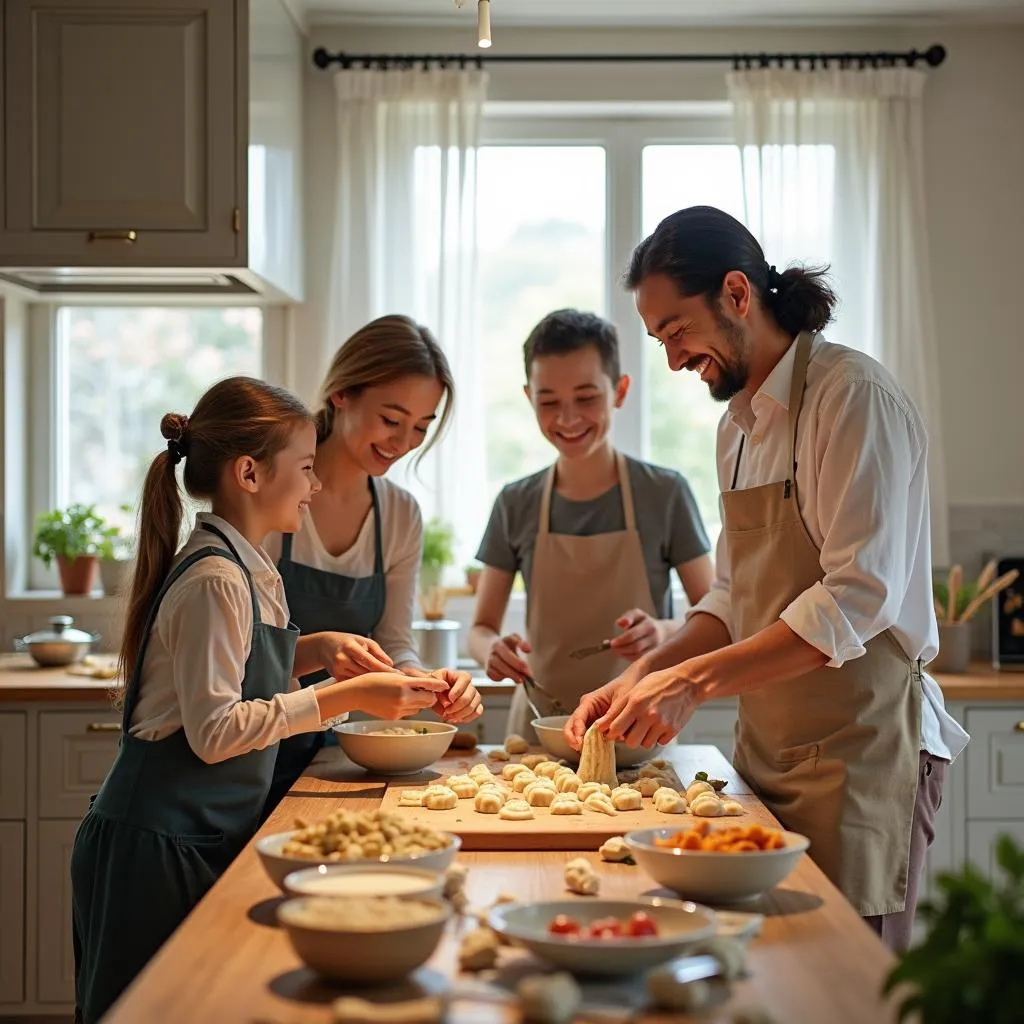Family celebrations are a common topic in IELTS Speaking tests, particularly when discussing cultural traditions and personal experiences. The question “Describe a family celebration that is important to you” has appeared frequently in past exams and is likely to remain relevant in future tests. To help you excel in this topic, let’s explore effective strategies and sample answers for each part of the IELTS Speaking exam.
Nội dung bài viết
Part 1: Introduction and Interview
In this section, the examiner may ask you some general questions about family celebrations. Here are a few possible questions along with a sample answer:
- Do you enjoy family celebrations?
- What kind of family celebrations do you have in your country?
- How often do you have family gatherings?
Let’s focus on the first question:
Examiner: Do you enjoy family celebrations?
Sample answer (Band 7-8):
“Absolutely! I relish family celebrations as they provide a wonderful opportunity to reconnect with loved ones and create lasting memories. These gatherings always fill me with a sense of warmth and belonging. Whether it’s a birthday, wedding, or holiday, I find great joy in the shared experiences and traditions that bring us together. The lively conversations, delicious food, and heartfelt moments make these celebrations truly special to me.”
This answer demonstrates a good range of vocabulary, including idiomatic expressions and descriptive language. The candidate expresses enthusiasm and provides specific reasons for enjoying family celebrations.
Part 2: Long Turn
Now, let’s look at a sample cue card for this topic:
Describe a family celebration that is important to you
You should say:
- What the celebration is
- When and where it takes place
- Who participates in it
- Why it is important to you
Here are sample answers for different band scores:
Band 6-7 Answer:
“I’d like to talk about our family’s New Year celebration, which is really important to me. It takes place every year on December 31st at my grandparents’ house in the countryside. All our family members, including aunts, uncles, and cousins, participate in this event.
We usually start gathering in the afternoon. Everyone brings some food, and we have a big feast together. After dinner, we play games and chat until midnight. When the clock strikes twelve, we all go outside to watch fireworks and make wishes for the new year.
This celebration is important to me because it’s a time when our whole family comes together. We don’t see each other often during the year, so this is a chance to catch up and strengthen our bonds. It’s also a tradition that’s been passed down through generations, which makes it even more special.”
Band 8-9 Answer:
“I’d be delighted to describe our family’s Lunar New Year celebration, which holds immense significance for me. This time-honored tradition takes place annually at the turn of the lunar calendar, typically in late January or early February, at my ancestral home in a quaint village on the outskirts of Hanoi.
The celebration is a grand affair that brings together our entire extended family, spanning four generations. From great-grandparents to the youngest cousins, everyone plays a role in the festivities. It’s truly heartwarming to see relatives from far and wide make the pilgrimage back to our family roots.
The celebration kicks off with a solemn ancestral worship ceremony, where we pay our respects to our forebears and seek their blessings for the year ahead. This is followed by a sumptuous feast featuring traditional dishes that have been lovingly prepared by the women of the family. The highlight of the meal is always the bánh chưng, a square sticky rice cake that symbolizes the earth.
As the day progresses, the atmosphere becomes more jovial. The elders dispense red envelopes containing lucky money to the younger generation, accompanied by words of wisdom and encouragement. Meanwhile, the children engage in traditional games like bầu cua (a dice game) and fly kites in the nearby fields.
This celebration holds profound importance for me for several reasons. Firstly, it serves as a powerful reminder of our cultural heritage and helps to preserve our traditions in an increasingly modernized world. Secondly, it fosters a sense of unity and continuity within our family, bridging the gap between generations. Lastly, it provides a rare opportunity for reflection and renewal, allowing us to express gratitude for the past year and set intentions for the one to come.
In essence, our Lunar New Year celebration is not just a festivity, but a cornerstone of our family’s identity and a testament to the enduring power of tradition and kinship.”
This answer demonstrates a high level of fluency, coherence, and lexical resource. The candidate provides a detailed description of the celebration, uses a wide range of vocabulary and idiomatic expressions, and explains the importance of the celebration in a thoughtful manner.
 Family celebrating Lunar New Year
Family celebrating Lunar New Year
Follow-up questions:
- How has this celebration changed over the years?
- Do you think family celebrations are becoming less important in modern society?
Sample answer for question 1 (Band 8-9):
“Over the years, our Lunar New Year celebration has undergone subtle transformations while maintaining its core essence. The most noticeable change has been the integration of technology. Nowadays, family members who can’t attend in person often join us via video calls, bridging geographical gaps. This has actually expanded our circle of celebration, allowing distant relatives to partake in the festivities.
Another shift has been in the culinary aspect. While traditional dishes remain the centerpiece, we’ve seen an influx of fusion recipes that blend time-honored flavors with modern cooking techniques. This culinary evolution reflects the changing tastes of younger generations while still paying homage to our heritage.
Interestingly, there’s been a resurgence of interest in traditional games and customs among the younger members of our family. Many are eager to learn and participate in rituals that they might have found old-fashioned in the past. This renewed enthusiasm has injected fresh energy into our celebrations and ensures the continuity of our traditions.
Despite these changes, the fundamental values of family unity, respect for elders, and cultural preservation remain steadfast. If anything, these adaptations have made our celebration more inclusive and relevant, allowing it to resonate with all generations.”
Part 3: Two-way Discussion
In this section, the examiner will ask more abstract questions related to the topic. Here are some possible questions:
- How do family celebrations differ across cultures?
- What role do you think technology plays in modern family celebrations?
- Do you believe family celebrations will remain important in the future? Why or why not?
Let’s focus on the third question:
Examiner: Do you believe family celebrations will remain important in the future? Why or why not?
Sample answer (Band 8-9):
“I firmly believe that family celebrations will continue to hold significant importance in the future, albeit with some adaptations to reflect changing societal norms and technological advancements.
Firstly, humans are inherently social beings with a deep-seated need for connection and belonging. Family celebrations fulfill this fundamental requirement by providing a platform for strengthening bonds and creating shared experiences. In an increasingly fast-paced and digitalized world, these gatherings offer a much-needed respite and an opportunity for face-to-face interactions, which I believe will become even more valued.
Secondly, family celebrations serve as vehicles for cultural transmission. They play a crucial role in preserving and passing down traditions, values, and customs from one generation to the next. As globalization continues to homogenize many aspects of our lives, people may feel a stronger urge to maintain their unique cultural identities through such celebrations.
However, it’s important to note that the nature of these celebrations may evolve. We’re likely to see more blended celebrations that incorporate elements from different cultures, reflecting the increasing prevalence of multicultural families. Additionally, technology will probably play a larger role, enabling virtual participation and new forms of shared experiences.
Furthermore, as awareness of environmental issues grows, we might witness a shift towards more sustainable celebration practices. This could involve using eco-friendly decorations, focusing on experiences rather than material gifts, or choosing plant-based menu options.
In conclusion, while the form and execution of family celebrations may adapt to future circumstances, their core purpose of fostering connection, continuity, and cultural identity will ensure their enduring importance in human society.”
This answer demonstrates a high level of critical thinking, with the candidate considering multiple perspectives and potential future scenarios. The response is well-structured, using a range of complex sentences and advanced vocabulary.
Key Vocabulary and Phrases
To elevate your speaking performance, incorporate these sophisticated words and phrases:
-
Cherish /ˈtʃerɪʃ/ (verb): to hold dear, protect and care for lovingly
Example: “I cherish the moments we spend together during our family celebrations.” -
Commemorate /kəˈmeməreɪt/ (verb): to recall and show respect for (someone or something) in a ceremony
Example: “We gather annually to commemorate our grandparents’ wedding anniversary.” -
Festivity /feˈstɪvəti/ (noun): the celebration of something in a joyful and exuberant way
Example: “The New Year’s Eve festivities always fill our home with laughter and music.” -
Tradition /trəˈdɪʃn/ (noun): a long-established custom or belief passed on from generation to generation
Example: “Preparing dumplings together is a cherished tradition in our family.” -
Togetherness /təˈɡeðənəs/ (noun): the state of being close to another person or other people
Example: “These celebrations foster a sense of togetherness among our extended family.”
 Family preparing traditional food for celebration
Family preparing traditional food for celebration
Examiner’s Advice
To achieve a high score in the IELTS Speaking test, particularly when discussing family celebrations:
-
Develop your ideas fully: Provide specific examples and personal anecdotes to support your points.
-
Use a range of vocabulary: Incorporate sophisticated words and idiomatic expressions related to celebrations and family.
-
Maintain fluency: Practice speaking on this topic to improve your ability to express ideas smoothly and coherently.
-
Show critical thinking: In Part 3, analyze the topic from different angles and consider broader implications.
-
Use appropriate tenses: When describing past events or ongoing traditions, ensure you use the correct verb tenses consistently.
-
Express opinions clearly: Use phrases like “In my view,” “I believe,” or “From my perspective” to articulate your thoughts confidently.
-
Practice pronunciation: Pay attention to the correct stress and intonation of words related to celebrations and cultural events.
Remember, the key to success is regular practice. Try to describe a memorable birthday party you had or describe a traditional dish you enjoy during a cultural festival to broaden your speaking skills on related topics. Additionally, you could describe a festival you look forward to every year to further enhance your ability to discuss cultural events and celebrations.
By following these tips and consistently working on your language skills, you’ll be well-prepared to tackle any question about family celebrations in your IELTS Speaking test. Remember, the goal is not just to answer the questions, but to engage in a natural, fluent conversation with the examiner while showcasing your English language abilities.


